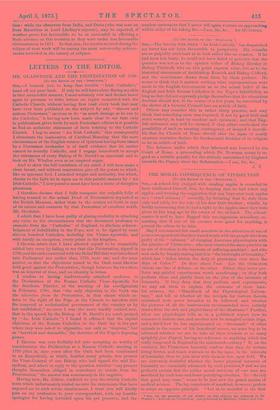LETTERS TO THE EDITOR.
MR. GLADSTONE AND THEPROTESTATION OF 1789. [TO THE EDITOR OF THIS " sewn...cos:1 iSisr—I beseech you to keep that terrible " Irish Catholic's" hand off my poor back. If only he will leave alone flaying my skin in that unmerciful manner, I most solemnly vow and declare never again to presume to write letters on topics connected with the Catholic Church, without having first read every book that may have Over been published on the subject by any "sincere and zealous Protestant," anxious to do "as much damage as he can to the Catholics," it having now been made clear to me that only in publications given forth by such Protestant editors is it possible to find an authentic statement of facts relating to the Catholic Church. I beg to assure " An Irish Catholic," that consequently I abominate the insinuation of Cardinal Manning that the mere circumstance of the English version of Quirinus having been issued by a Protestarit bookseller is of itself evidence that its matter cannot be soundly Catholic, and I engage henceforth to accept the utterances of every Bishop of St. David's as canonical, and to look on Mr. Whalley even as an inspired organ.
And to show- the full contrition of my mind, I will here make a clean breast, •and without reservation give all the points to which, like an ignorant fool, I attached weight and authority, but which, thanks to the light let in upon me in this painful manner by "An Irish Catholic," I now perceive must have been a tissue of deceptive phantoms.
I therefore declare that I fully recognise the culpable folly of having trusted to the actual Deed of Protestation deposited at the British Museum, rather than to the version set forth in type of its nature and contents by that Protestant of excellent worth, Mr. Stockdale.
I admit that I have been guilty of glaring credulity in attaching any value to the circumstances that the document professes to emanate from the "Catholics" of England, to disclaim acknow- ledgment of Infallibility in the Pope, and to be signed by some sixteen hundred Catholics, including the Vicars-Apostolic, and with hardly an exception, every priest in the kingdom.
I likewise admit that I have allowed myself to be shamefully misled into error by failing to see that this Protestation, signed in 1789, and the oath connected with the Relief Bill that was introduced into Parliament not earlier than 1791, were one and the same matter, so that the objections raised to the Oath must likewise hold good against the Protestation, though between the two there was an interval of time, and no identity in terms.
I confess to having inadvertently attached credence to the Declaration of the Roman Catholic Vicar-Apostolic for the Southern District, at the meeting of his coreligionists in February, 1790, that "the only objection to the Oath was the alteration from the Protestation, in that clause which re- lates to the right of the Pope or the Church to interfere with the temporal or ecclesiastical government of the country as by law established ;" an error I was the more readily enticed into, that in the speech by the Bishop of St. David's (so much praised by "An Irish Catholic") I found it affirmed that the capital objection of the Roman Catholics to the Oath lay in the part where they were asked to stigmatise, not only as "impious," but as "heretical and damnable," the doctrine of the Pope's deposing power.
I likewise was very foolishly led into accepting as worthy of consideration the Declaration at a Roman Catholic meeting in 1799 (that is, nine years after the Oath had been condemned in an Encyclical), at which, besides many priests, was present the Vicar-General of one Bishop who had signed the said En- cyclical, and where in reply to the question whether " any present thought themselves obliged in conscience to recede from the Protestation," the answer was unanimously in the negative.
Having now, Mr. Editor, confided to you the strictly Catholic texts which unfortunately misled me into the statements that have exposed me to such severe chastisement, I trust you will kindly pass on my confession to your correspondent, with my humble apologies for having intruded upon his pet preserve, and the
amplest assurances that I never will again venture on approaching within miles of his raking fire.—I am, Sir, &c., AN OUTSIDER.


































 Previous page
Previous page